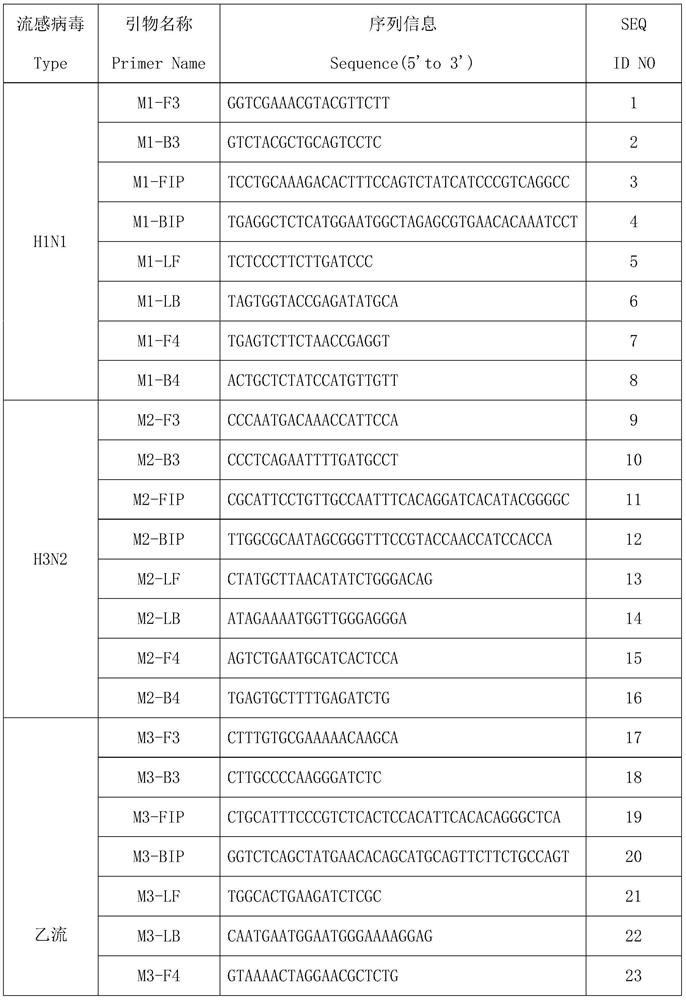A multiplex lamp primer combination for detecting multiple influenza viruses and its application
An influenza virus and primer combination technology, applied in the biological field, can solve problems such as false positives of primers, and achieve the effects of short reaction time, simple experimental equipment, and simple result judgment
- Summary
- Abstract
- Description
- Claims
- Application Information
AI Technical Summary
Problems solved by technology
Method used
Image
Examples
Embodiment 1
[0057] This example provides a multiplex LAMP primer combination for detecting multiple influenza viruses, refer to figure 1 As shown, in this example, a pair of primers F4 and B4 are added to the periphery of the traditional F3 and B3 to improve the reaction speed and sensitivity. The difficulty of adding a pair of primers mainly lies in primer design. Too many primers can easily cause primer dimers. The primer sequences of the final design and screening of the multiple LAMP primer combinations obtained in this example are shown in Table 1.
[0058] Table 1 Primer sequences of the multiplex LAMP primer combination of Example 1
[0059]
[0060]
[0061] Note: M1, M2, M3 are prefixes added to facilitate the distinction between the first primer set, the second primer set and the third primer set, and do not change the type of primers.
[0062] The primers of each primer set in Table 1 were artificially synthesized and used for later use. In the first primer set, the mo...
Embodiment 2
[0065] This embodiment provides a multiplex LAMP detection method, which utilizes the primer combination of Example 1 for LAMP detection, or first designs and synthesizes the multiplex LAMP primer combination of Example 1.
[0066] After obtaining the multiple LAMP primer combination of Example 1, the multiple LAMP detection method for multiple influenza virus detection specifically includes the following steps:
[0067] The multiple LAMP primer combination was formulated into primer MIX, in the primer MIX, the concentrations of FIP and BIP were 1.6 μM, the concentrations of B3 and F3 were 0.2 μM, the concentrations of LF and LB were 0.4 μM, and the concentrations of F4 and B4 were 0.3 μM; this μM is the abbreviation of μmol / L commonly used in the industry.
[0068] S2. Prepare a reaction system for loop-mediated isothermal amplification reaction. In this embodiment, the detection of the sample to be tested is taken as a test group, and the reaction system includes the DNA tem...
Embodiment 3
[0081] This embodiment provides a multiple LAMP detection method, which adds a sample collection and mixed detection step on the basis of the steps of Embodiment 2. The step is specifically: collecting samples to be tested, and mixing a plurality of samples to be tested for mixed testing. The number of samples to be tested is 5 or 10.
[0082] Mixed detection is a common method used to reduce the number of detections, and is often used in conjunction with PCR (Polymerase ChainReaction, polymerase chain reaction) detection. However, the disadvantage of mixed detection is: mixing the samples will reduce the concentration of the sample to be tested, which may be lower than the lower limit of PCR detection; resulting in an unsatisfactory mixed detection effect; but the sensitivity (lower detection limit) of LAMP is 100 times higher than that of conventional PCR, so the mixed detection is suitable for The effect of LAMP test results is much smaller than that of PCR test.
[0083]...
PUM
 Login to View More
Login to View More Abstract
Description
Claims
Application Information
 Login to View More
Login to View More - R&D
- Intellectual Property
- Life Sciences
- Materials
- Tech Scout
- Unparalleled Data Quality
- Higher Quality Content
- 60% Fewer Hallucinations
Browse by: Latest US Patents, China's latest patents, Technical Efficacy Thesaurus, Application Domain, Technology Topic, Popular Technical Reports.
© 2025 PatSnap. All rights reserved.Legal|Privacy policy|Modern Slavery Act Transparency Statement|Sitemap|About US| Contact US: help@patsnap.com



